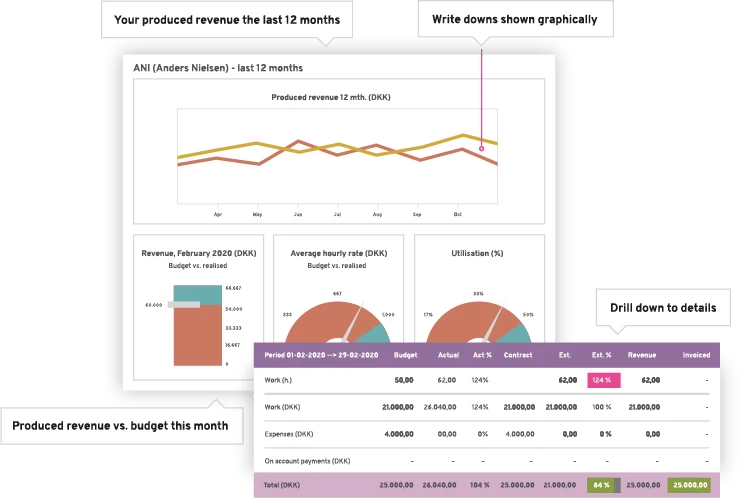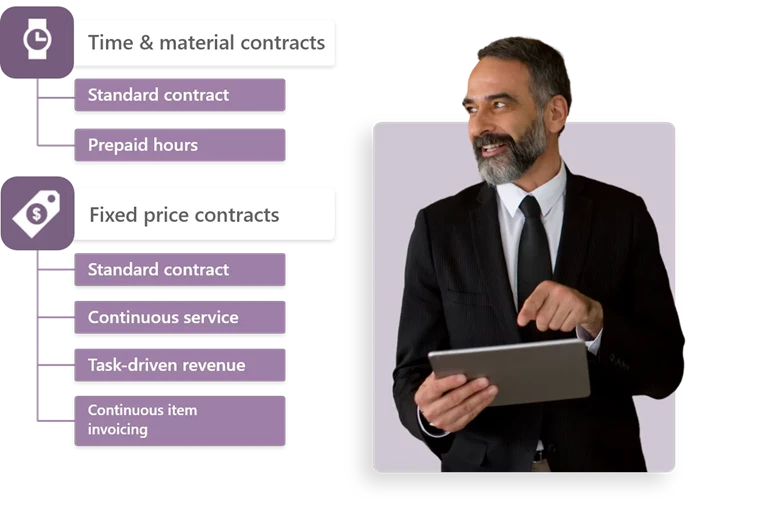Feedback: A consultant's key to achieving high performance
9 min read
Time tracking
Build your perfect data foundation for spotless invoicing and deep business insights with easy time tracking.
Project management
Be a world champion project manager. Keep your projects on track - and profitable.
Resource management
Efficiently staff projects and run a predictable business with confidence.
Insights & Reporting
Get smarter - faster - to make clever decisions for long-term growth impact.
Project accounting & Invoicing
Invoice everything - fast and accurate - while staying on top of project finances.
Staff & Salary
Give accountants and HR an intelligent tool to eliminate draining administration.
Financial Systems
TimeLog offers standard integrations for all your favourite financial systems. Save time and reduce manual tasks.
Payroll Solutions
TimeLog offers standard integrations for multiple payroll solutions. Get easy salary administration and only enter payroll information once.
Add-ons
Track time automatically via Outlook, use gamification or find another add-on that can support your business.
Multiple Legal Entities
You can create synergy between your departments and across borders and offices with the Multiple Legal Entities module from TimeLog.
Business Intelligence
Utilise the insights you get from TimeLog to the fullest. Our system is ready to integrate with multiple BI solutions.
Partner Integrations
TimeLog PSA is part of a large ecosystem. Get an overview of all the partner integrations in the TimeLog family.
Economy department
Save 1-2 days a month on your invoicing process.
Project teams
From planning to execution and evaluation. Robust tools for every project manager.
Management teams
Create a performance-driven culture with solid reporting capabilities.
Large enterprises
Enhance operations and performance across entities, countries and departments.
NGOs and non-profit organisations
Simplify internal processes, spend less time on administration, and get documentation in place - at a discounted rate.
Blog
Get inspired to run an even better business with articles, guides and analyses.
Guides, podcasts and webinars
Get access to templates, guides and webinars that help and inspire you.
Help Center
Looking for help material and user guides to the TimeLog system? Look no further. Find all the help you need now.
Get a single source of truth
Discover how companies maintain a single source of truth across borders, departments, and currencies.
Get integrated
Discover the advantages customers gain from utilising our integrations and API.
Reporting in real-time
Explore how others leverage reporting to optimise their processes and make informed decisions.
Get started with resource planning
Discover how other companies thoroughly grasp their resources and enhance their ability to predict future trends.
Improved project financials
This is how the efficient financial toolbox from TimeLog helps project managers and CFOs improve their project financials.
Faster invoicing
Discover how other companies have slashed the time spent on invoicing by 75% - and uncover how you can achieve the same efficiency.
The Story of TimeLog
Get insights on TimeLog and how we can help you grow and evolve your business.
Employees
See who shows up every day to deliver the best PSA solution.
Career
What's life like at TimeLog? Are we hiring? Get the answer here.
Partner
Create even more value for your customers, as well as ours, as a TimeLog Partner.
Premium Service
Online Help Center, tailored onboarding and support from Day 1.
Corporate Social Responsibility
We work to ensure a positive impact on planet, people and businesses.
Security and GDPR
Learn more about how we work to keep your data safe and provide maximum security.
5 min read
Not only customer meetings and communication are digital these days. Also the invoicing process in many companies needs a digital overhaul. Get three tips, so you can invoice more hours faster.

Online meetings instead of physical meetings, chat and phone instead of quickly stopping by a colleague’s desk. Virtual Friday bar and online aerobic via Teams. The world looks a lot different these days. We are virtual.
My experience shows that many have not yet met the potential there is in digitalising the consultancy’s lifeblood: The invoicing process.

TimeLog's CEO, Per-Henrik Nielsen, has previously described a selection of the digital tools TimeLog makes use of while we primarily work from home.
I want to strike a blow for and call your attention to what I call the consultancy’s lifeblood: The invoicing process.
My experience shows that many companies have not yet met the potential of digitalising and automating this process. Therefore, they lack an overview of whether all hours are invoiced, cannot see the expected revenue and waste time on manual processes.
Invoicing is not only the work of setting up and sending the invoices. The process starts way earlier. Actually already before we start the project.

From SPI Research’s Professional Services Maturity Benchmark analysing 500+ consultancies, we know that:
... are some of the aspects characterising the best-performing companies. And the invoicing process is, of course, no exception.
And with ”invoicing process” I not only mean the work with setting up and sending the invoices. The process starts way earlier, actually already, before we start the project (but we will get back to that).
First, you get a few examples from the business world of what can happen if we do not streamline our processes:

Scenarios like these do not happen because we (or our colleagues) are incompetent or do not care. They are a natural and (very) common consequence of us not having streamlined, automated or digitalised our processes before, during and after the invoicing.
My experience shows that you gain the most value by starting by:
1. Save time on your invoicing with automation
Automation is one of the concepts that either fills us with emptiness or brings the biggest smile to our faces.
Tracking your work hours is the most important data you have in a consultancy.

Automation is a vital necessity when it comes to the invoicing process.
Automation ensures that you collect all relevant data, save time, reduce the number of manual errors and invoice even more.
Tracking your work time is your most critical data in a consultancy. Each time you register for one hour, you can see right away:
But it is not until you start collecting and using the data in a dedicated time tracking system, which also supports project management and invoicing, that you can start to automate your invoicing process.
But what precisely can you automate, and what are the benefits? Let me give you four examples of that:
Round up automatically to the nearest 15 minutes
You can secure automatic rounding of your time registrations. You can e.g. always round up to the nearest 15 minutes. In this way, 38 minutes on the phone, automatically turn into 45 minutes on the invoice.
Smooth communication between project and finances
You can create automatic approval flows between the project and finance departments. Thereby, the project manager can simply mark payments and invoice drafts ready for invoicing, and the bookkeeper doesn’t need to ask each month.
Avoid bottlenecks
You can write internal notes on future payments directly in the system, if there is anything you need to assess before you invoice the payments. It removes a lot of post-its both for the project manager and the bookkeeper and it ensures that everyone can take over, e.g. if someone falls ill right around the change of the month.
Make it easy to get a revenue forecast
You can get a revenue forecast, as you see all future payments on your long-term projects on fixed price, prepaid hours and service agreements. At the same time, you know that the payments automatically show up for invoicing without anyone needs to remember anything.
With these relatively simple tips, I have seen companies that have decreased their time spent on invoicing from three full days to just half a day. At the same time, the billing rate is increased, and you shorten the time from when you do the work to when you invoice the customer.
This brings me to tip number two:
Companies’ use of systems and digital tools is increasing. We collect more data. And that presents a new challenge for many companies: We need system integrations that seamlessly send data where they are needed.
It is unnecessary to run a complete ERP solution or collect everything in one system (that quickly get difficult to deal with).
But without integrations between your essential business systems, you risk spending too much time updating the same data in different systems, losing overview or working overtime to keep up with controlling numbers, clients, and accounts.
And just like that - we are at the third tip already:
Today, you get the most important thing last. If you want to optimise your invoicing process, it demands you change work routines and start delegating some of the traditional bookkeeper tasks to, e.g. the project manager or the account manager.
Who has the closest relation to the customers? It is here your invoicing process starts.

As I wrote in the beginning of the article, the invoicing process already starts when we create the project.
For most companies, the task delegation demands that we increase communication and, at the same time, make sure we have a common understanding of how we run projects.
We need access to the same data and the same time, all involved parties need to see the project’s progress, future milestones, payments and much more – in short: We need a shared operational framework.

To some, it will be a new way of structuring the processes. But the benefits in return are that you can:
Those were the three tips of the day for your invoicing process.
 Read more
Read more
 Read more
Read more

8 min read
 Read more
Read more
 Read more
Read more
 Read more
Read more